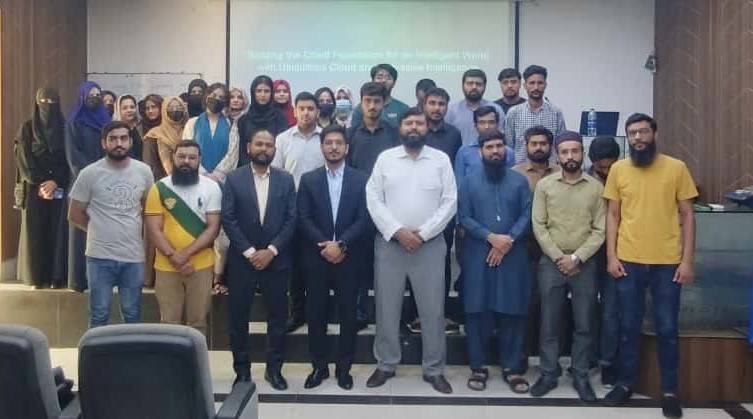

Minister of State for Federal Education and Professional Training, Wajiha Qamar, has warned that Pakistan cannot achieve genuine progress in education unless communities, institutions, and policymakers foster a collective sense of ownership.
Highlighting the challenge of a rapidly growing population, she underscored that community engagement, addressing the economic causes that force children out of schools, and the constructive use of technology are essential to raising literacy levels.
She was speaking at a ceremony on “Promoting Literacy through Digitalisation,” jointly organized by the Ministry of Education, JICA, AQL, the Pakistan Institute of Education (PIE), and the National Commission for Human Development (NCHD). The event was attended by Federal Secretary for Education Nadeem Mehboob, PIE DG Dr. Shahid Soroya, UNESCO Country Representative Fuad Pashayev, JICA Specialist Bilal Aziz, MoE focal person Sana Essa, and other key stakeholders.
On the occasion, Minister Wajiha Qamar and Secretary Nadeem Mehboob launched two major initiatives: “Communication Training for Non-Formal Teachers” and a “Code of Conduct for Teachers’ Professional Skills.” These projects aim to enhance teaching standards and provide non-formal educators with structured skill development.
The minister stressed that many children leave school to support their families economically. She argued that by linking education with skill development, parents will see tangible livelihood opportunities, making it easier to keep children in classrooms. She also noted that the education emergency declared by the government is not only about enrolling out-of-school children but equally about improving quality and learning environments for those already in school.
Wajiha Qamar highlighted the Ministry’s collaboration with the Ministry of IT to use social media platforms such as TikTok to promote literacy and digital learning. She praised the efforts of Secretary Nadeem Mehboob, UNESCO, JICA, AIOU, and PIE DG Dr. Shahid Soroya for their technical leadership in advancing literacy initiatives.
Federal Secretary for Education Nadeem Mehboob emphasized that literacy is both a fundamental right and the foundation of Pakistan’s social, economic, and democratic progress. Recalling the National Education Emergency imposed in May 2024, he shared that the Ministry is finalizing a Non-Formal Education Policy Framework focused on second-chance education, digital literacy, and access for marginalized communities.
He revealed that Pakistan has set ambitious targets: enrolling 25.3 million children in schools and providing literacy opportunities for 70 million adults. Under the “Each One Teach One” campaign, every literate individual will be encouraged to educate one illiterate person. Flexible education models through BECS and NEF, alongside e-learning platforms and mobile applications, will expand access. He further announced that students completing five grades under the non-formal system will now be examined and certified by the Federal Directorate of Education, enabling them to transition to mainstream schooling.
AIOU Vice Chancellor Dr. Nasir Mahmood pointed out that Pakistan’s literacy rate is growing by just 1% annually, while the population rises by 2.7%, making national targets difficult to achieve. He stressed that the gap lies in implementation, not in policy design.
NCHD DG Ali Asghar informed that the Commission is actively pursuing the “Each One Teach One” program at the district level and aims to enroll 100,000 out-of-school children this year. PIE DG Dr. Muhammad Shahid Soroya shared data on literacy trends, while MoE’s Sana Essa, JICA, and UNESCO representatives provided insights into digital literacy and ongoing international support.




